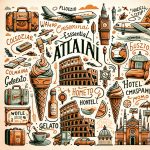When traveling to Italy, having a basic understanding of key travel phrases in Italian can greatly enhance your experience and interactions with locals. From greetings to ordering food, navigating transportation, and asking for directions, knowing a few essential phrases can make a big difference.
Whether you’re exploring the bustling streets of Rome or wandering through the charming villages of Tuscany, being able to communicate in Italian will not only help you navigate your way around but also make meaningful connections with the people you meet.
Italy is a country known for its rich history, stunning architecture, delicious cuisine, and warm hospitality. By familiarizing yourself with common Italian greetings like “ciao” and “buongiorno,” as well as mastering useful phrases for everyday interactions, you’ll be able to immerse yourself more fully in the local culture.
Whether you’re ordering a cappuccino at a café, asking for directions to a famous landmark, or bargaining at a street market, speaking even just a few words in Italian can go a long way in bridging any language barriers and creating unforgettable memories during your trip.
In this article, we will delve into various key travel phrases that will not only help you communicate effectively while exploring Italy but also provide insights into Italian culture, customs, and etiquette. From shopping tips to emergency situations, we’ll cover everything you need to know to navigate the streets of Italy like a seasoned traveler. So grab your notebook and start practicing those basic Italian phrases – because your next adventure in Italy awaits.
Greetings and Basic Phrases
When traveling in Italy, it is essential to familiarize yourself with key travel phrases in Italian to enhance your overall experience. Starting with greetings and basic phrases can make a significant difference in your interactions with locals and help you navigate various social situations smoothly. Whether you are saying “ciao” (hello) to a new acquaintance or expressing gratitude with “grazie” (thank you), mastering these basic greetings can go a long way in establishing positive connections during your travels.
Common Greetings
One of the first things you will notice when visiting Italy is how important greetings are in daily interactions. Learning common phrases like “buongiorno” (good morning), “buonasera” (good evening), and “buonanotte” (good night) can help you start conversations on the right foot. Additionally, using expressions like “come stai?” (how are you?) shows that you are interested in engaging with the local culture and people.
Useful Phrases for Everyday Interactions
In addition to greetings, having a repertoire of basic phrases for everyday interactions can be incredibly helpful while traveling in Italy. Simple expressions such as “per favore” (please), “scusa” (excuse me), and “mi dispiace” (I’m sorry) can show respect and politeness when communicating with locals. Whether you are ordering a coffee at a cafe or browsing through a store, incorporating these phrases into your conversations can make your experiences more enjoyable and meaningful.
Navigating Transportation
Taking Taxis
When taking a taxi in Italy, it’s important to know how to communicate with the driver effectively. You can start by saying “Buongiorno” or “Buonasera” as a greeting, followed by stating your destination clearly. Some key phrases to remember are “Mi può portare a ” (Can you take me to ), “Quanto costa andare a ” (How much does it cost to go to ), and “Più veloce possibile, per favore” (As fast as possible, please).
Using Public Transportation
If you prefer using public transportation like buses or trains in Italy, knowing some basic phrases will come in handy. When boarding a bus or train, you can ask “Dove si compra il biglietto?” (Where do you buy the ticket?) or “Quando arriva il prossimo treno/bus per ?” (When does the next train/bus for arrive?). It’s also useful to learn common terms like biglietto (ticket), partenza (departure), and arrivo (arrival) for navigating transportation schedules.
Other Modes of Transportation
For other modes of transportation such as ferries or trams in Italy, it’s beneficial to familiarize yourself with specific travel phrases. You may need to ask where the nearest ferry terminal is by saying “Dov’è il molo più vicino?” or inquire about tram stops with “Dove posso prendere il tram?”. Being able to understand directions and instructions related to different modes of transportation will enhance your traveling experience in Italy.
Ordering Food and Drinks
When traveling to Italy, one of the most enjoyable aspects is undoubtedly trying out the amazing Italian cuisine. To fully immerse yourself in the culinary delights of the country, it is essential to learn some key travel phrases in Italian related to ordering food and drinks. Whether you are dining at a local trattoria or sipping an espresso at a cafe, knowing how to communicate your preferences and understand the menu will enhance your dining experience.
One of the first phrases you should familiarize yourself with is “Io vorrei ordinare,” which translates to “I would like to order.” This polite introduction can be followed by specifying what dish or drink you desire. For example, saying “vorrei una pizza margherita” means “I would like a margherita pizza.” It’s also helpful to know basic food items such as “pane” for bread, “pasta” for pasta, or “pesce” for fish.
Understanding menu items in Italian restaurants can sometimes be challenging for non-native speakers. However, by learning common terms like “antipasto” for appetizer, “primi piatti” for first courses, and “secondi piatti” for main courses, you will be able to navigate through the menu with ease.
Additionally, phrases like “il conto per favore” which means “the check please” will come in handy when finishing your meal. With these essential phrases in hand, you can confidently enjoy delicious meals throughout your stay in Italy.
| Italian Phrase | English Translation |
|---|---|
| “Io vorrei ordinare” | “I would like to order” |
| “vorrei una pizza margherita” | “I would like a margherita pizza” |
| “il conto per favore” | “the check please” |
Asking for Directions
When traveling in Italy, it is essential to be able to ask for directions and navigate your way through the beautiful cities. Knowing key travel phrases in Italian can greatly help you in finding landmarks, exploring hidden gems, and getting around with ease. Here are some useful phrases to use when asking for directions:
- “Mi scusi, dove si trova il Colosseo?” (Excuse me, where is the Colosseum?)
- “Come posso arrivare alla Fontana di Trevi?” (How can I get to the Trevi Fountain?)
- “Potrebbe indicarmi la strada per Piazza San Marco?” (Could you show me the way to St. Mark’s Square?)
Navigating Italian cities can sometimes be a challenge due to their intricate layout and historical architecture. However, by using these key travel phrases, you can confidently ask for directions and explore the beauty of Italy without getting lost.
In addition to asking for directions, it’s also helpful to know how to understand responses from locals. Be sure to listen carefully and look out for visual cues that may be provided along with verbal instructions. Remember that Italians are known for their gestures and animated communication style, so pay attention not only to what is said but also how it is conveyed.
Whether you’re wandering through the charming streets of Florence or trying to find your way through the bustling alleys of Naples, having a basic understanding of key travel phrases in Italian for asking directions will enhance your travel experience and make your exploration of Italy more enjoyable. So don’t be afraid to engage with locals, ask for help when needed, and immerse yourself in the vibrant culture of this stunning country.
Shopping and Bargaining
When traveling to Italy, one of the most enjoyable activities is exploring the local markets and shops. To make your shopping experience more pleasant and efficient, it’s useful to know some key travel phrases in Italian for communicating with vendors and bargaining for the best prices. Whether you’re looking for unique souvenirs, fresh produce, or fashionable clothing, having a few essential phrases at your disposal can enhance your shopping experience in Italy.
meaning “Can I have a discount?” or “Qual è il prezzo migliore che puoi farmi?” which asks for the best price they can offer. Being polite and respectful while bargaining is key in Italian culture.
can assist you in finding what you’re looking for. Additionally, learning numbers in Italian will be beneficial when discussing prices and quantities during your shopping excursions. By mastering these key phrases for shopping and bargaining in Italian, you’ll feel more confident navigating through markets and interacting with local vendors during your travels in Italy.
Emergency Situations
In case of emergency situations while traveling in Italy, it is essential to be prepared with key phrases to seek help, contact authorities, and deal with emergencies effectively. Whether you are facing a medical issue, lost belongings, or any other unforeseen circumstance, knowing how to communicate in Italian can make a significant difference. Here are some crucial phrases that can assist you in navigating emergency situations:
- “Aiuto.”: This simple word means “Help.” and can be used to call for assistance in an emergency scenario.
- “Chiamate la polizia.”: Translating to “Call the police.”, this phrase is valuable when you need law enforcement intervention.
- “Ho bisogno di un medico.”: If you require medical attention, saying “I need a doctor” using this phrase can alert others about your emergency.
Being able to communicate clearly in Italian during an emergency can hasten response times and ensure that you receive the necessary help promptly. Remembering these key travel phrases in Italian could make a significant difference in handling unexpected situations effectively.
- “Dove posso trovare un pronto soccorso?”: When seeking urgent or emergency care, asking “Where can I find an emergency room?” is vital.
- “Mi hanno rubato il passaporto.”: In the unfortunate event that your passport has been stolen, informing others by saying “My passport has been stolen” can initiate necessary steps for assistance.
- “Non mi sento bene.”: If you feel unwell or have sudden health issues, letting others know by saying “I do not feel well” will help them understand your condition promptly.
By familiarizing yourself with these essential phrases for emergencies before your trip to Italy, you can better prepare yourself for unexpected situations and ensure a safer travel experience overall. It is always better to be proactive and ready with the right words that may prove invaluable during challenging times abroad.
Cultural Tips and Etiquette
As you embark on your journey to Italy, mastering key travel phrases in Italian will not only help you navigate the country smoothly but also enhance your overall experience. Being able to greet locals with a warm “Ciao” or “Buongiorno” sets a positive tone for any interaction. Basic phrases like “Grazie” (thank you) and “Per favore” (please) show respect and politeness, which are highly valued in Italian culture.
Understanding Italian cultural norms and customs is essential for a truly immersive travel experience. Italians take pride in their culinary traditions, so knowing how to order food and drinks using phrases like “Il conto, per favore” (the bill, please) can elevate your dining experience. Similarly, brushing up on bargaining phrases for shopping at local markets demonstrates respect for the art of negotiation that is common in Italy.
In times of need or emergencies, knowing key travel phrases in Italian can be a lifesaver. Being able to seek help with phrases like “Aiuto.” (help.) or contact authorities by saying “Chiamate la polizia” (call the police) can make all the difference. By familiarizing yourself with these crucial phrases and cultural etiquette, you can ensure a smoother, more enriching travel experience in Italy.

I’m a passionate traveler, writer, and Italophile. My fascination with Italy’s history, art, and culture has led me on countless adventures across the Italian landscape. Through “I Live Italy,” I share my love for this extraordinary country and aims to inspire others to explore its boundless beauty.





